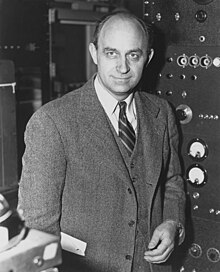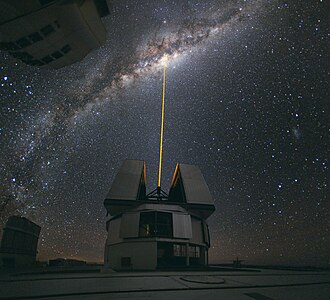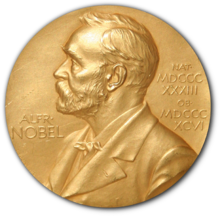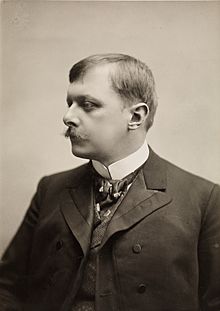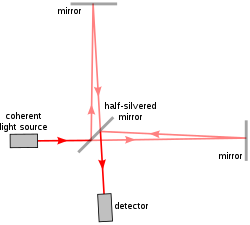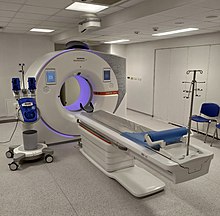Portal:Physics
| Physics Portal Main Page | Physics Textbook | Wikiprojects and things to do |
The Physics Portal


Physics is the natural science of matter, involving the study of matter, its fundamental constituents, its motion and behavior through space and time, and the related entities of energy and force. Physics is one of the most fundamental scientific disciplines, with its main goal being to understand how the universe behaves. A scientist who specializes in the field of physics is called a physicist.
Physics is one of the oldest academic disciplines and, through its inclusion of astronomy, perhaps the oldest. Over much of the past two millennia, physics, chemistry, biology, and certain branches of mathematics were a part of natural philosophy, but during the Scientific Revolution in the 17th century these natural sciences emerged as unique research endeavors in their own right. Physics intersects with many interdisciplinary areas of research, such as biophysics and quantum chemistry, and the boundaries of physics are not rigidly defined. New ideas in physics often explain the fundamental mechanisms studied by other sciences and suggest new avenues of research in these and other academic disciplines such as mathematics and philosophy.
Advances in physics often enable new technologies. For example, advances in the understanding of electromagnetism, solid-state physics, and nuclear physics led directly to the development of new products that have dramatically transformed modern-day society, such as television, computers, domestic appliances, and nuclear weapons; advances in thermodynamics led to the development of industrialization; and advances in mechanics inspired the development of calculus. (Full article...)
Enrico Fermi (Italian: [enˈriːko ˈfermi]; 29 September 1901 – 28 November 1954) was an Italian and later naturalized American physicist, renowned for being the creator of the world's first nuclear reactor, the Chicago Pile-1, and a member of the Manhattan Project. He has been called the "architect of the nuclear age" and the "architect of the atomic bomb". He was one of very few physicists to excel in both theoretical physics and experimental physics. Fermi was awarded the 1938 Nobel Prize in Physics for his work on induced radioactivity by neutron bombardment and for the discovery of transuranium elements. With his colleagues, Fermi filed several patents related to the use of nuclear power, all of which were taken over by the US government. He made significant contributions to the development of statistical mechanics, quantum theory, and nuclear and particle physics.
Fermi's first major contribution involved the field of statistical mechanics. After Wolfgang Pauli formulated his exclusion principle in 1925, Fermi followed with a paper in which he applied the principle to an ideal gas, employing a statistical formulation now known as Fermi–Dirac statistics. Today, particles that obey the exclusion principle are called "fermions". Pauli later postulated the existence of an uncharged invisible particle emitted along with an electron during beta decay, to satisfy the law of conservation of energy. Fermi took up this idea, developing a model that incorporated the postulated particle, which he named the "neutrino". His theory, later referred to as Fermi's interaction and now called weak interaction, described one of the four fundamental interactions in nature. Through experiments inducing radioactivity with the recently discovered neutron, Fermi discovered that slow neutrons were more easily captured by atomic nuclei than fast ones, and he developed the Fermi age equation to describe this. After bombarding thorium and uranium with slow neutrons, he concluded that he had created new elements. Although he was awarded the Nobel Prize for this discovery, the new elements were later revealed to be nuclear fission products. (Full article...)Did you know -

- ... that lasers can be used to separate two isotopes very efficiently?
- ... that your feet are slightly younger than your head, because time runs slow at a lower Gravitational Potential. This is a consequence of Gravitational Time Dilation
- ...that Max Planck created a system of measurement based solely on natural units?
Selected image -

The Feynman Lectures on Physics is a 1964 physics textbook by Richard P. Feynman, Robert B. Leighton and Matthew Sands, based upon the lectures given by Feynman to undergraduate students at the California Institute of Technology (Caltech) in 1961–63.
It includes lectures on mathematics, electromagnetism, Newtonian physics, quantum physics, and the relation of physics to other sciences. Six readily accessible chapters were later compiled into a book entitled Six Easy Pieces: Essentials of Physics Explained by Its Most Brilliant Teacher, and six more in Six Not So Easy Pieces: Einstein's Relativity, Symmetry and Space-Time.
Related portals
May anniversaries
- May 1, 1960 - U-2 spy plane shot down
- May 6, 1937 - Hindenburg fire
- May 9, 1012 BC – Solar Eclipse seen at Ugarit, 6:09–6:39 PM.
- May 9, 1904 – City of Truro, a steam locomotive exceeds 100 mph (160 km/h).
- May 10, 1946 – V-2 rocket's first successful launch at White Sands Proving Ground
- May 10, 1960 – The nuclear submarine USS Triton completes Operation Sandblast, the first underwater circumnavigation of the earth.
- May 11, 1862 – American Civil War: The ironclad CSS Virginia is scuttled in Virginia.
- May 11, 1995 – In New York City, over 170 countries extend Nuclear Nonproliferation Treaty indefinitely, without conditions.
- May 11, 1998 – India conducts three underground nuclear tests, including a thermonuclear device.
- May 14, 2018 - Ennackal Chandy George Sudarshan died.
- May 16, 1960 - Theodore Maiman operates the first optical laser, at Hughes Research Laboratories in Malibu, California.
- May 16, 1969 – Venera 5, a Soviet spaceprobe, lands on Venus.
- May 17, 1865 – The International Telegraph Union is established.
- May 18, 1974 - India conducts underground nuclear tests, named Smiling Buddha.
- May 18, 1998 - Microsoft sued by US Government
- May 19, 1943 - RAF uses bouncing bombs in combat
- May 20, 1932 - Amelia Earhart crosses Atlantic Ocean
- May 26, 1972 - President Nixon and Leonid Brezhnev sign nuclear weapon non-proliferation pact.
- May 24, 1844 - First official telegraph message is sent by Samuel Morse.
- May 27, 1937 - Grand opening, Golden Gate Bridge
- May 28, 1998 – Pakistan conducts five underground nuclear tests, named Chagai-I.
Births
- May 6, 1872 - Willem de Sitter, physicist, mathematician, and astronomer
- May 9, 1931 – Vance Brand, astronaut
- May 10, 1746 – Gaspard Monge, mathematician
- May 10, 1788 – Augustin-Jean Fresnel physicist
- May 10, 1963 – Lisa Nowak, astronaut
- May 11, 1918 – Richard Feynman, physicist
- May 14, 1686 - Gabriel Fahrenheit, physicist and engineer
- May 21, 1921 - Andrei Sakharov, nuclear physicist
Deaths
- May 10, 1482 – Paolo dal Pozzo Toscanelli, mathematician and astronomer
- May 16, 1830 – Joseph Fourier, French scientist
- May 17, 1916 – Boris Borisovich Galitzine, Russian physicist
General images
Categories

Fundamentals: Concepts in physics | Constants | Physical quantities | Units of measure | Mass | Length | Time | Space | Energy | Matter | Force | Gravity | Electricity | Magnetism | Waves
Basic physics: Mechanics | Electromagnetism | Statistical mechanics | Thermodynamics | Quantum mechanics | Theory of relativity | Optics | Acoustics
Specific fields: Acoustics | Astrophysics | Atomic physics | Molecular physics | Optical physics | Computational physics | Condensed matter physics | Nuclear physics | Particle physics | Plasma physics
Tools: Detectors | Interferometry | Measurement | Radiometry | Spectroscopy | Transducers
Background: Physicists | History of physics | Philosophy of physics | Physics education | Physics journals | Physics organizations
Other: Physics in fiction | Physics lists | Physics software | Physics stubs
Physics topics
Classical physics traditionally includes the fields of mechanics, optics, electricity, magnetism, acoustics and thermodynamics. The term Modern physics is normally used for fields which rely heavily on quantum theory, including quantum mechanics, atomic physics, nuclear physics, particle physics and condensed matter physics. General and special relativity are usually considered to be part of modern physics as well.
More recognized content
Associated Wikimedia
The following Wikimedia Foundation sister projects provide more on this subject:
-
Commons
Free media repository -
Wikibooks
Free textbooks and manuals -
Wikidata
Free knowledge base -
Wikinews
Free-content news -
Wikiquote
Collection of quotations -
Wikisource
Free-content library -
Wikiversity
Free learning tools -
Wikivoyage
Free travel guide -
Wiktionary
Dictionary and thesaurus
Sources
- ^ In this Polish name, the surname is Skłodowska.

